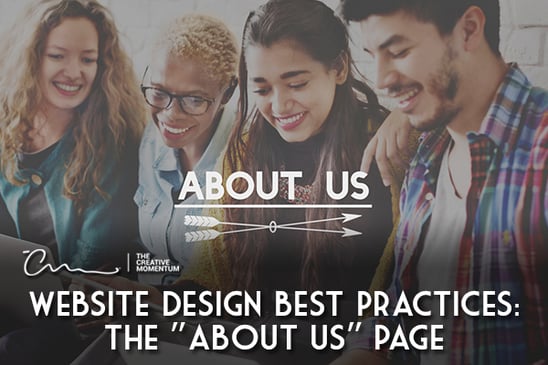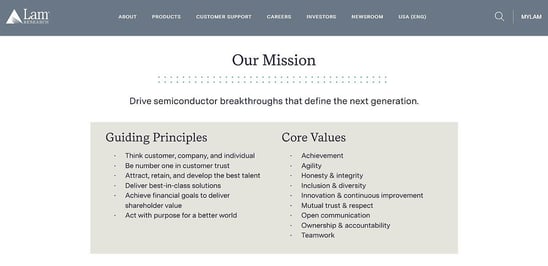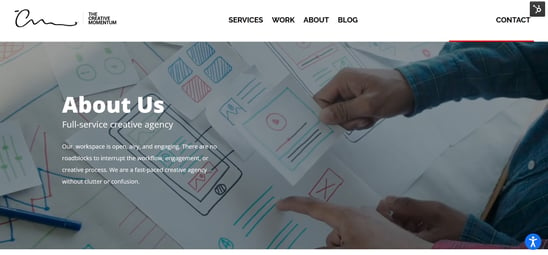
In the not-so-distant past, few customers bothered to read a company’s About Us page. Now, as customers focus more on social issues, such as diversity and sustainability, they have become more interested in knowing who they are doing business with. This compels brands to sharpen their storytelling skills and paint a picture of the company worth viewing. Has your About Us page accomplished this? If not, here are some tips and crucial elements to consider.
Why You Need an About Us Page
There are a lot of sources people can turn to when they need information about your company. From social media pages to news features, there is likely more than enough information already out there. So, why do you need an About Us page with longer text than your Facebook bio?
1. Personalization - Be a Brand People Can Get Behind
Companies have learned the importance of personalization, but most are focused only on providing personalized services to customers. Don't forget to provide personalized info about your company!
This means putting in a little extra effort to make your About Us page pop.
- Include real photos of your team in action
- Have your executives craft an authentic, thoughtful mission statement
- Let staff write their own bios using their unique voices
When brands successfully accomplish this, customers more easily bond with the brand and incorporate it into their lives. Authenticity and story-telling has always been an important part of inbound marketing, and it's importance has continued to grow.
Consumers – especially gen x, millennial, and gen z – have become more invested in which brands they align themselves with, and personalized About Us information provides important context for your company. It gives them a peek behind the curtain, so to speak, that helps them feel confident about your brand and its values. The About Us page provides an excellent opportunity to build this necessary connection with your prospects.
2. Highlight Sustainability or Other Social Responsibility Efforts
Part and parcel with the above, this is the page where you can highlight all the ways you're giving back or protecting the environment.
One study in the UK and America found that 88% of consumers expect companies to help them live sustainable lives.
Companies that are committed to sustainability can use the About Us page to explain these efforts. It's a win-win: companies can document their work towards making the world a better place, consumers seeking such companies can feel confident in their carefully researched choices.
3. Credibility
The newer the business, the more important it is to boost credibility, and incorporating it into your web design can help. Business owners can use the About Us page to provide social proof and proof of qualifications. For example, a solar installation company might be only a year old. However, the workers might have at least 10 years of experience, and the owner may have worked in the industry or led a prominent company in that same field.
Establishing credibility is particularly important for marketing funnels in technical industries or fields that rely on substantial industry knowledge. Think high-level computing, professional market analyses, or thought leadership roles. In these fields, it's essential to know who's giving advice and what credentials they have to back up their claims.
We can personally vouch for seeing this in practice -- many of the software and technology firms we've worked with find that their About Us page is one of their most heavily-trafficked pages!
As an example, check out how IBM establishes credibility on their About page. By creating a dedicated hub for leadership and giving each executive a profile, readers have an easy way to view the executive's role, history at the company, and even his/her social profiles, all from a single source. It's an easy way to establish both credibility and that all-so-important personalization that savvy readers respond to, especially valuable for companies in the software-as-a-service (SaaS), healthcare, B-corporation, service, and consultancy industries.
4. Information for Media
Have you ever Googled your name or business name to discover you were featured in articles you never even knew about? Journalists do not always inform business owners that they have mentioned them or completed write-ups on the business. This means they might never call you to get answers to questions either. An About Us page is an excellent one-stop-shop for them to get all the information they need – and to get it right.
How to Structure Your About Us Page
The structure of your About page is the top determinant of whether prospects will stick around long enough to read it. A long page full of text is sure to put even the most investigative journalist or curious customer to sleep. Here are some better alternatives.
1. Videos
The best way to tell a story is by video. This can be something simple and eye-catching to draw readers in (as we've illustrated above on our own About page), but feel free to get creative. A short, documentary-style video could present text-heavy information in a much more appealing way. The key is to stick to the highlights and leave out all the extra details people might not be interested in.
2. Slideshows
Companies with long and complex histories that they are proud of often use slideshows in their web design to document everything. Journalists and students are especially interested in this information. However, consumers might also find it interesting when rumors fly and they want to fact-check the company’s history and prior involvements.
3. Infographics
Not many companies use infographics to showcase their histories, and that’s a shame. There are so many creative ways to use infographics to organize the information in a way that’s sure to capture people’s attention and their imagination. The younger and more creative the target demographic, the more effective this approach is.
4. Photos
Videos, slideshows, and infographics take time to create. If you are pressed for time or money, photos are still an excellent way to get the job done. You can get photos taken of the entire team and then the individuals. This can help to personalize the business because buyers can match names to faces.
5. Text
Search engines are becoming smarter and can recognize visual input. Even so, there is nothing they read better than text. Consequently, for SEO purposes, it’s important to include text in web design, no matter what other format you use. For example, some companies write out a transcript of the About Us video.
What to Include in Your About Us Page

Credit: Nike
No matter how you structure your About Us page, if the content is boring, no one will care to read, watch, or listen to it. Knowing what to include begins with getting to know your audience and why they visit your website’s About Us page. We like Nike's About page for how it accomplishes these goals, deftly illustrating the company's vision, motivation, and commitment to sustainability all alongside some powerful, high-impact video.
Your own About page doesn't need to re-invent the wheel, but generally speaking, these are the main things to include:
1. Company History
What are the main accomplishments and most interesting developments in the company’s history? What are the things that occurred that you believe are newsworthy? For example, readers might not care when you hired your VP of sales, but they are interested in knowing when you merged with a local competitor. Other important highlights include the founding date of a chiropractor’s office or when an attorney first became admitted to the bar.
2. Social Responsibility Efforts
We already mentioned the About page is the place to feature your social responsibility efforts, so make sure to include them. Any effort to give back to local communities or causes you support is worth mentioning. These might include:
- Sponsoring local sports events
- Donating to cancer research
- Paying workers a base rate of $15 per hour
- And more
3. Leadership and Employee Profiles
People generally want to know who owns and manages a company. The newer the company, the more important this information is. When there are people in the company with spectacular qualifications, this is also worth mentioning. For example, a law office might mention a paralegal who became an associate attorney, or a medical facility might highlight a head nurse with 30 years of experience.
4. Mission

Credit: Lam Research
As a rule, it's good to include details about your company mission somewhere on your About page. This doesn't need to be a laser-focused mission statement or long-winded diatribe about your company's history, but it can be a helpful way to show readers the "why" of what you do.
Lam Research has a great section on this, with clear bullet points providing an outline of the company's guiding principles and core values. It's brief, but it provides important details on what moves the company forward.
5. Recognition
If the company or its key personnel received any important awards relevant to their fields, that’s definitely worth mentioning. For example, doctors mention when they are board-certified and young entrepreneurs are proud of receiving “top 40 under 40” awards. When awards are prestigious and the company or key worker only received a nomination, it’s still worth mentioning.
6. Work With Us
Your About Us information is a common destination for job seekers and those interested in your company. Prospective employees navigate to your About page to learn how they can work for you so be sure to link to your jobs or careers page. Adding this connection point during the web design process will make things easier for them and draw a higher number of vested candidates through your recruitment funnel.
Check out other common pages in our Website Design Best Practices series!
Website Design Best Practices: Homepage Design
Website Design Best Practices: The Services Page
Website Design Best Practices: The Resources Page
Website Design Best Practices: The Pricing Page
Website Design Best Practices: The Contact Page
Website Design Best Practices: Creating a Company Blog
How to Write the Best About Us Page
When writing your About Us page, it’s important that your page reflect who "you are" as a company. The areas above will help you paint the picture.
About us: At the Creative Momentum, we help clients create interactive About Us pages that customers want to read and journalists want to share. Contact us for more information or to get a quote.



